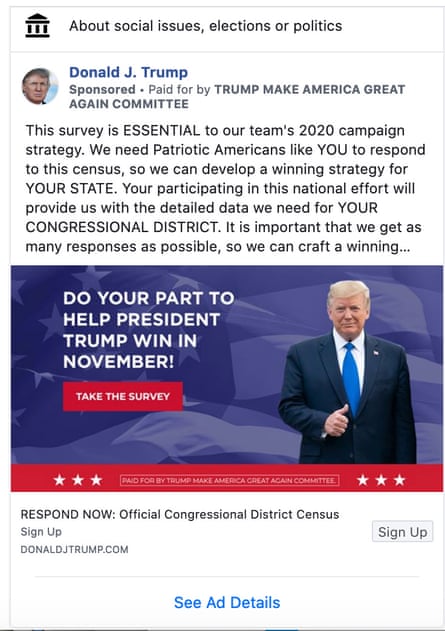Facebook has announced it will remove a series of misleading ads from Donald Trump’s re-election campaign.
The Trump Make America Great Committee posted 2,000 iterations of an ad this week, asking users to respond to the “Official Congressional District Census”. Instead of information at the Census Bureau, however, the posts linked to a push-poll survey on the GOP fundraising site action.donaldjtrump.com, which also requests personal information for the campaign.

Advocates said this could interfere with the actual census, which begins for most Americans with mailers in mid-March. The census is a once-in-a-decade event that seeks to count every person in the country, with drastic consequences for resource allocation and government representation nationwide.
Trump’s campaign had sponsored and posted the misleading ads on 2 and 3 March, according to Facebook’s ad library, which archives political ads. Most of the posts have fewer than 2,000 impressions, or times it was on someone’s screen, but several reached tens of thousands. The vast majority of those viewed by the Guardian cost less than $100.
After asking questions such as “Do you think Nancy Pelosi and the Radical Left are putting their personal anti-Trump agenda ahead of what’s best for the American people?” the site asks for a user’s contact information.
Terms of that website say that “by providing your phone number, you are consenting to receive calls and SMS/MMS messages, including autodialed and automated calls and texts, to that number from each of the participating committees in the Trump Make America Great Again Committee, Donald J Trump for President and the Republican National Committee.”
A spokesperson for the Census Bureau refused to comment directly on the ads, but pointed to official guidelines that recommend Americans “fight 2020 census rumors” by reporting “any advertisement on social media sharing fake 2020 census websites and inaccurate information”.
Facebook’s stated policy on census misinformation bans “misrepresentation of the dates, locations, times and methods for census participation.”
A Facebook spokesperson told the Guardian: “There are policies in place to prevent confusion around the official US census and this is an example of those being enforced.”
But the ads still made it through the initial vetting process and the company initially doubled down, saying that it was clear the ad wasn’t referring to the “official census”, according to journalist Judd Legum. Facebook only began removing the posts Thursday after media inquiries and pressure from civil rights advocates such Vanita Gupta, president of the Leadership Conference on Civil and Human Rights.
Facebook announced last year it was doubling down on election-time misinformation. Since the midterm elections in 2018, Facebook’s policy has prohibited content that easily leads to voter suppression and automatically prevents posts like that from being visible. The network said federal agencies and state election chiefs can tell the company directly about such posts, and took down a handful on Super Tuesday.
But some experts say Facebook still is not equipped to handle election year misinformation.
Meanwhile, this is not the first time the Trump administration’s efforts have affected the census. Trump had originally attempted to include a question in the census of whether a respondent was a citizen – leading to fears the census could be used to intimidate people related to undocumented immigrants. That was overturned in a June 2019 supreme court decision, but census workers are still likely to deal with the residual effects.
“The Trump administration has already sowed significant confusion about the census when it decided to push the now-dead citizenship question,” said Tom Wolf, counsel at the Brennan Center’s Democracy Program. “We’re still cleaning up that mess.”
The Trump campaign did not respond to request for comment.
